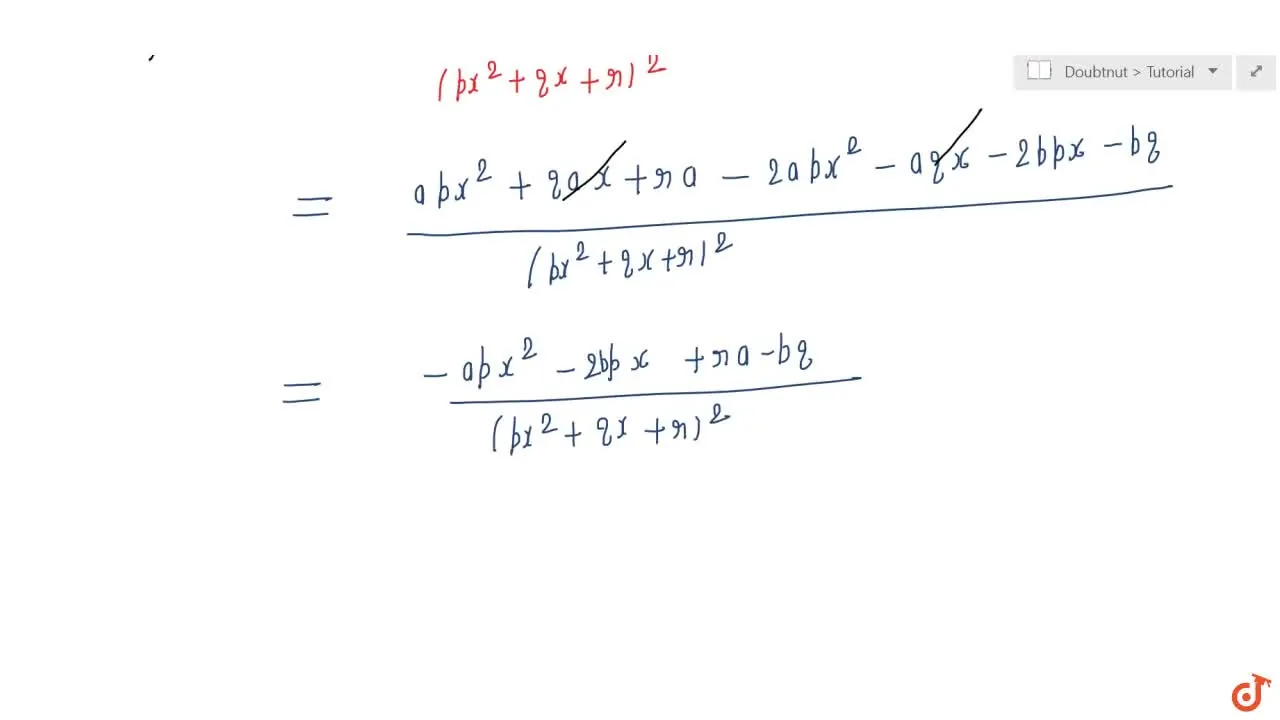Find derivative of the following functions (it is to be understood that a, b, c, d, p, q, r and s are fixed non-zero constants and m and n are integers): ax+bpx2+qx+r
Let f(x)=ax+bpx2+qx+r
Let u=(ax+b),v=(px2+qx+r)
using quotient rule
f'(x)=(uv)'=u'v−v'uv2
=a(px2+qx+r)−(2px+q)(ax+b)(px2+qx+r)2
=apx2+aqx+ar−2px(ax+b)−q(ax+b)(px2+qx+r)2
=apx2+aqx+ar−2pax2−qax+qb−2pbx(px2+qx+r)2
=−apx2−2abx−qb+ar(px2+qx+r)2
=−apx2−2abx+ar−bq(px2+qx+r)2
Related Playlists
- BOOK - NCERTCHAPTER - LIMITS AND DERIVATIVESEXERCISE - EXERCISE 13.211videos
LIMITS AND DERIVATIVES
- BOOK - NCERTCHAPTER - LIMITS AND DERIVATIVESEXERCISE - EXERCISE 13.38videos
LIMITS AND DERIVATIVES
- BOOK - NCERTCHAPTER - LIMITS AND DERIVATIVESEXERCISE - SOLVED EXAMPLES25videos
LIMITS AND DERIVATIVES
- BOOK - NCERTCHAPTER - INTRODUCTION TO THREE DIMENSIONAL GEOMETRYEXERCISE - EXERCISE 12.14videos
INTRODUCTION TO THREE DIMENSIONAL GEOMETRY
- BOOK - NCERTCHAPTER - LINEAR INEQUALITIESEXERCISE - EXERCISE 6.210videos
LINEAR INEQUALITIES
Similar Questions
Find derivative of the following functions (it is to be understood that a, b, c, d, p, q, r and s are fixed non-zero constants and m and n are integers): ax+bcx+d
View SolutionFind derivative of the following functions (it is to be understood that a, b, c, d, p, q, r and s are fixed non-zero constants and m and n are integers): 1+1x1−1x
View SolutionFind derivative of the following functions (it is to be understood that a, b, c, d, p, q, r and s are fixed non-zero constants and m and n are integers): (x2+1)cosx
View SolutionFind derivative of the following functions (it is to be understood that a, b, c, d, p, q, r and s are fixed non-zero constants and m and n are integers): cosx1+sinx
View SolutionFind derivative of the following functions (it is to be understood that a, b, c, d, p, q, r and s are fixed non-zero constants and m and n are integers): sin (x + a)
View SolutionFind derivative of the following functions (it is to be understood that a, b, c, d, p, q, r and s are fixed non-zero constants and m and n are integers): sin(x+a)cosx
View SolutionFind the derivative of the following functions (it is to be understood that a, b, c, d, p, q, r and s are fixed non-zero constants and m and n are integers) :
sin(x+a)View SolutionFind derivative of the following functions (it is to be understood that a, b, c, d, p, q, r and s are fixed non-zero constants and m and n are integers): sinnx
View SolutionFind the derivative of the following functions (it is to be understand that a,b,c,d,p,q,r and s are fixed non-zero constants and m and n are integers):
(x+a)View SolutionFind the derivative of the following functions (it is to be understood that a, b, c, d, p, q, r and s are fixed non-zero constants and m and n are integers) :
sinnxView Solution


